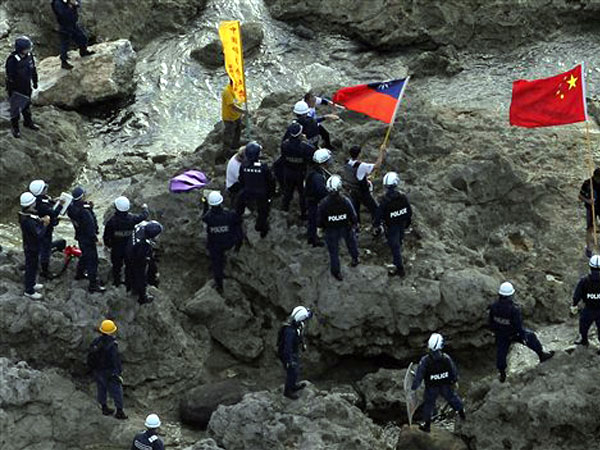
Activists holding Chinese and Taiwanese flags are arrested by Japanese police officers after landing on Uotsuri Island, one of the islands of Senkaku in Japanese and Diaoyu in Chinese, in East China Sea on August 15. AP/Yomiuri Shimbun
PENGCHIA, Taiwan—Taiwan’s president used a high-profile visit to a Taiwanese islet on Friday to warn Japan against making any attempts to nationalize islands that are part of a disputed chain in the East China Sea.
Escorted by warplanes and naval vessels, President Ma Ying-jeou flew by military helicopter to Taiwan’s Pengchia Islet, which lies off northern Taiwan, only about 140 kilometers (85 miles) west of the disputed chain.
The chain — known as Senkaku in Japan and Diaoyu in China — is controlled by Japan but also claimed by China and Taiwan, and has been a key part of simmering regional tensions over rival territorial claims. Japan’s government reportedly is planning to buy several of the islands from their private Japanese owners.
Analysts say Ma chose the Taiwanese islet to make his well-measured gesture to raise international attention without further aggravating tensions.
Disputes have flared over island chains in the East China and South China seas, rich fishing grounds with potentially lucrative oil and gas reserves.
But diplomatically isolated Taiwan — which China claims a part of its own territory 63 years after the two sides split amid civil war — has been largely left out of the spotlight.
Ma called on the East China Sea chain’s three claimants — Taiwan, China and Japan — to put aside their disputes and hold dialogues to jointly develop the rich resources there. He suggested bilateral or trilateral talks “to resolve the issue in a peaceful way.”
Ma also asked commanders at two Taiwan-controlled islets in South China Sea’s (West Philippine Sea) Pratas and Spratly island chains to strengthen guards. Those chains are claimed by Taiwan, China, Vietnam, the Philippines, Brunei and Malaysia.
“Ma has tried to avoid provoking tension, but as Taiwan’s leader, he must make a gesture even though the impact may be limited,” said Lo Chih-cheng, a political scientist at Taipei’s Soochow University.
While Taiwanese media were generally skeptical about the visit’s impact, some say Ma’s trip may manage to rebut Beijing’s appeal for a united front with Taiwan over the disputes. Many Taiwanese fear Beijing may be using its warming economic ties with Taiwan in recent years to further its goal of unifying with the self-ruled democratic island.
“The mainland is trying to create the false scenario of cross-Strait cooperation in the East and South China” seas, Taiwan’s China Times said in an editorial.
In Beijing, Chinese Foreign Ministry spokesman Hong Lei reacted to Ma’s visit by reiterating China’s longstanding stance on the dispute.
“The Diaoyu islands have belonged to China since ancient times,” he said. “People from both sides of the strait both have responsibility in safeguarding Chinese territories.”